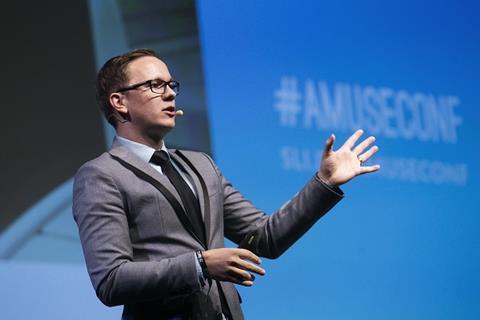
In the second of a series of articles ahead of NEXUS 17 (the annual forum that gathers pharmaceutical supply chain leaders to shape the future of track and trace), Tim Sykes interviews Dr. Bertalan Mesko, The Medical Futurist.
Tim Sykes:
From my point of view as journalist focusing on the medical industry in terms of packaging/serialisation, I’ve already seen various things spoken about as ‘the future’ come into reality. Can you give a sense of how the medical and pharmaceutical industries have already been transformed by the implementation of smart technologies?
Dr. Bertalan Mesko:
My view is that the medical and pharma industry still has a long way to go in realising the benefits of smart technologies. As The Medical Futurist, my research focuses on the technological trends that could have the biggest impact on our lives, medicine and healthcare. We need to build bridges between what’s possible today and which science fiction technologies could become real in the future.
That said, there are some real-life examples where disruptive technologies are beginning to make care cheaper. For example, in Haiti, the organisation Field Ready is working on 3-D printing of on-demand birthing kits, including umbilical clamps and oxygen splitters for oxygen tanks. In addition, to address the poor patient-doctor ratio in some parts of sub-Saharan Africa and to avoid the need for patients to travel long distances to gain access to treatment, Himore Medical in Cameroon has designed CardioPad, a wireless solution enabling the efficient monitoring of cardiovascular diseases (CVDs) from a long distance through Bluetooth and a mobile network.
Further examples can be found here
TS:
How far is the remaining journey in terms of realising the potential of serialisation? I’m thinking both in terms of full implementation of what is today possible and where you (as a futurologist) foresee further development and future capabilities in serialisation technology.
BM:
There is no doubt that technology will play a pivotal role in advancing the future of the medical and healthcare industries; drug serialisation is one of the greatest transformations currently taking place within the pharmaceutical supply chain today. We are just taking our very first steps into the world of track and trace and the possibilities it brings. While many companies in Europe are now focused on complying with the new regulations, they should take a future-focused approach and consider the wider supply chain benefits that can be achieved by leveraging the vast amounts of data that will now be available.
When 3D printing reshapes factories, on demand 3D printing of drugs becomes possible and patients could assess more information about the drugs they use through augmented reality devices, companies will realise it’s time to redesign their business models.
TS:
You write about a vast range of ideas on the future of medicine, a significant number of which relate to the digitisation of our world and the disruptive impact of the IIOT. Can you summarise how you see the future healthcare system and its related supply chains?
BM:
There are a number of disruptive technologies that have the potential to transform the future of medicine. Take gamification for example and its ability to reach and engage with populations online. Pokemon Go got people off the couch and taking their literal first steps towards a healthy lifestyle. Gamification has the potential to help improve both adherence and pharma’s image.
Augmented and virtual reality also holds enormous potential for pharma. Devices such as Google’s digital contact lenses or Oculus Rift give us a new view of the world through digital information and create the potential for more engaging patient communication.
It’s important that new developments within the pharmaceutical supply chain have patient empowerment and engagement at their heart. Drug development is just not enough anymore. Digital health solutions enable worldwide compliance. But developing digital health is only possible by listening to patients’ needs. This is where I see the biggest gap in pharma companies.
TS:
How soon do you think we will begin to realise this future?
BM:
There is no point in making blind predictions. My job is finding out what makes decision makers in companies today think from a new perspective about involving disruptive innovations in practice. If policy makers create a regulatory framework that welcomes innovations but still keeps products safe, it realises faster. If companies involve patient design and embrace disruption, the process becomes smoother.
Dr. Bertalan Mesko will be presenting at NEXUS 17, an annual forum, hosted by TraceLink, dedicated to shaping the future of track and trace in the life sciences industry, on 7 and 8 June in Barcelona. Packaging Europe will be reporting from the event.









